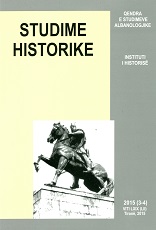Grupimet politike dhe tiparet e rezistencës Shqiptare kundër pushtuesit italian (1942-1943)
Political groups and features of Albanian resistance against Italian occupation (1942- 1943)
Author(s): Sonila BoçiSubject(s): Military history, Political history, Recent History (1900 till today), WW II and following years (1940 - 1949), Fascism, Nazism and WW II
Published by: Qendra e Studimeve Albanologjike
Keywords: Albanian resistance; Italian occupation (1942- 1943);
Summary/Abstract: The article deals with some issues regarding the stage of Albanian organized resistance against the Italian invaders. It analyzes the Albanian Communist Party’s difficulties and the challenges to organize its inner structures; to gain the support of different groups of Albanians society and to find a way to unify the majority of Albanians into a national liberation front against the invaders. In this process, communist chiefs pursued the Comintern directives and Yugoslav model that were provided to them by the Yugoslav emissaries. Balli Kombëtar (National Front) is the other organization taken into consideration in this article. The program of the organization, its composition and all the challenges Ballihas to cope with are broadly analyzed. Relations between the Fronti Nacional çlirimtar (National Liberation Front) and Balli Kombëtar occupied a large place in the paper. The main efforts of these organizations were to ensure the Albanians support for their own political purposes. In this process, both sides have their advantages and disadvantages. Resistance against the invaders was one of the topics of the program that should bring together both organizations, but in reality the situation was more complex. Both groups agreed to be engaged in the resistance against invaders. However, there were differences about forms and methods for such a resistance. In spring 1943, the National Liberation Front and National Front reached an agreement on mutual cooperation at local level. These agreements resulted nothing but problematic. Both organization lacked trust. They both sought to gain control by undermining the other. The article treats the relationship between Front Nacional çlirimtarand Balli Kombëtaras a process, trying to analyze the reasons why these rival organizations were transformed into sworn enemies.
Journal: Studime Historike
- Issue Year: 2015
- Issue No: 03-04
- Page Range: 137-162
- Page Count: 26
- Language: Albanian
- Content File-PDF

